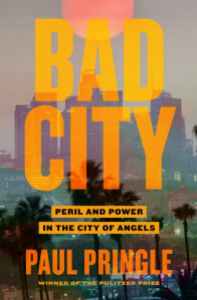
Photo (cc) 2015 by Dan Kennedy
Earlier this month, The New York Times published a fascinating book review about a sex-and-drugs scandal at the University of Southern California — and about an alleged attempt by the top leadership at the Los Angeles Times to cover it up. I put the book, “Bad City,” by Paul Pringle, at the top of my reading list, thinking I might assign it to my media ethics students this fall.
Oh, but not so fast. Because one of the editors who handled the USC story, Matthew Doig, has written a retort on Medium. And believe me, you can tell he’s not worried about the possibility that Pringle will sue him. Among other things, Doig calls Pringle’s book “utter bullshit” and writes that “it’s disappointing that several media outlets have thus far failed to bring even a modicum of skepticism to such an absurd tale. The truth is that Pringle is a fabulist who is grossly misrepresenting the facts to support his false narrative.”
Whoa. To provide a bit of background, Pringle was part of a team of reporters who looked into the matter of Carmen Puliafito, the dean of USC’s Keck School of Medicine, who was video-recorded taking crystal meth and heroin with a group of young people and who turned a young woman into essentially his sex slave. This is pretty explosive stuff. In “Bad City,” Pringle claims that the LA Times’ leading executives, publisher and editor Davan Maharaj and managing editor Marc Duvoisin, tried to squash the story because USC was one of the paper’s most important advertisers. As NY Times reviewer Katie Benner puts it:
Pringle’s fast-paced book is a master class in investigative journalism, explaining how a reporter wrestles information and documents from reluctant sources and government officials. It is a stark look at the weakening of local news, especially at The Los Angeles Times.
I should add that this played out in 2016 and ’17, when the paper had been suffering from years of chaotic ownership. The billionaire surgeon Patrick Soon-Shiong bought the paper in 2018, bringing a measure of stability as well as some much needed financial resources.
According to Pringle, Maharaj and Duvoisin may have been forced out as a consequence of their bad behavior. Doig, the assistant managing editor for investigations, also departed. Although he’s not named in Benner’s review, he is identified in several excerpts from Pringle’s book that have been published elsewhere. Here’s what Doig has to say about how the USC story actually played out:
I have every email and story draft I exchanged with reporters and editors concerning the Puliafito/USC story — from the moment I got involved in April 2017 until we published a bulletproof story in July 2017 that ended Dr. Carmen Puliafito’s career, thoroughly embarrassed USC and resulted in zero corrections, clarifications, or lawsuits against the LA Times. (I’ll link to several of the documents I cite here, but I am willing to hand over the entire file — dozens of records amounting to a definitive paper trail of how the story evolved — to a serious journalist with the time to go through them and draw their own conclusions).
The quickest way to prove that Pringle is abusing the truth when he says Duvoisin and I simply delayed the story and added no value is to compare Pringle’s draft that Duvoisin emailed to me on April 12, 2017 to the story that we published on the front page on July 17 of that year.
And on and on Doig goes, including a mind-boggling anecdote in which he claims that Pringle became enraged after Doig referred to a draft of his story as “good” rather than “great.”
So who’s telling the truth? I’m not going to touch that one, especially since I haven’t read the book. But it seems significant that Doig not only used what lawyers call “actionable” language in writing about Pringle but that he’s also landed on his feet — he’s now investigations editor at USA Today. Likewise, Duvoisin is now editor-in-chief of the San Antonio Express-News, which has done so much good work on the Uvalde massacre. Maharaj has had his own problems, but those appear to have nothing to do with his handling of the USC story.
One question that’s worth asking is what responsibility news organizations have in passing along accusations such as those leveled by Pringle in his book without doing any fact-checking of their own. Doig goes into some detail about that in his essay. Among other things, he laments the lack of fact-checking by the book’s publisher (welcome to the wonderful world of books) and writes that the NY Times should have done some reporting:
The New York Times wrote a cloying review of Pringle’s book that included a character assassination of Duvoisin and Maharaj (I wasn’t named in the review), but the reporter failed to contact Duvoisin and Maharaj for comment. When I emailed the reporter and her editor about it, the editor responded that it was a review, not a reported story, and that I should contact Pringle’s publisher.
I have to say that the NY Times editor is right. Reviews are not reported pieces, and it would be unheard-of for a reviewer to re-report the facts in a book they are reviewing.
So what’s next? Personally, I’ve crossed “Bad City” off my reading list and am not going to assign it to my students — though I may pull together some readings, including excerpts from “Bad City,” Benner’s review and, of course, Doig’s essay. I’m also interested to see whether the controversy dies down, or if instead there’s much more to come.


